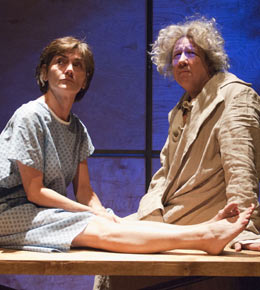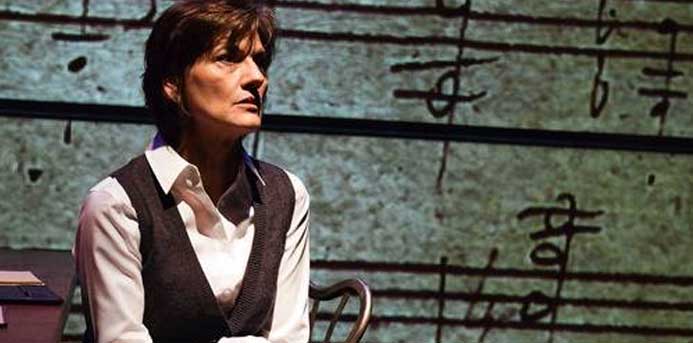This drama first won attention three years ago as a vehicle for Jane Fonda, who returned to Broadway after decades offstage.
But Nick Bowling’s production for TimeLine Theatre Company (hosted at the larger Stage 773 venue, rather than TimeLine’s home space on Wellington Avenue in Chicago) proves that star power isn’t needed in this Moises Kaufman’s drama about an ALS-stricken Beethoven scholar determined to finish one last work.
Janet Ulrich Brooks, who has become the gold standard in Chicago for characters with sharp elbows and sharper minds, turns Dr. Katherine Brandt into a woman who, as her body deteriorates, blossoms in her understanding of “why a genius became obsessed with mediocrity.” It’s a performance that dazzles on multiple levels, even as Kaufman’s script hits some obvious notes of its own.
The mediocrity in question started out as a simple waltz by Viennese music publisher Anton Diabelli, who asked several prominent composers in 1819 to contribute variations on his initial theme. Originally dismissed by Beethoven as “a cobbler’s patch,” the piece became the inspiration for 33 variations – all created as the composer was losing his hearing – that still stand as one of his grandest achievements. Kaufman juxtaposes the increasingly infirm Katherine’s quest in Bonn to uncover the story behind the variations with an increasingly anguished Beethoven (Terry Hamilton, who nails both the pathetic and fearsome qualities of the genius), desperately trying to stay one step ahead of penury as he faces his own looming mortality.
 There are undeniable echoes of Margaret Edson’s “Wit,” in which an acerbic John Donne scholar confronts terminal ovarian cancer. But Kaufman, who first came to attention in the 1990s with “Gross Indecency: The Three Trials of Oscar Wilde,” based on actual trial transcripts and newspaper accounts of the English playwright’s tragic fall, has a tendency in “33 Variations” to add a few too unnecessary fillips to his parallelisms between Brandt and Beethoven – to underscore for us when letting us draw our own conclusions might be better.
There are undeniable echoes of Margaret Edson’s “Wit,” in which an acerbic John Donne scholar confronts terminal ovarian cancer. But Kaufman, who first came to attention in the 1990s with “Gross Indecency: The Three Trials of Oscar Wilde,” based on actual trial transcripts and newspaper accounts of the English playwright’s tragic fall, has a tendency in “33 Variations” to add a few too unnecessary fillips to his parallelisms between Brandt and Beethoven – to underscore for us when letting us draw our own conclusions might be better.
Unlike the solitary Vivian Bearing in Edson’s play, Katherine has a put-upon daughter, Clara (Jessie Fisher in a hugely sympathetic portrayal), whose inability to settle on a career exasperates her mother. She is matched in the Beethoven segments by Anton Schindler (Matthew Krause), the “friend of Beethoven” (it said so on his business cards) who tries to keep the master on track and feeds him, much as Clara, her nurse boyfriend, Mike (Ian Paul Custer) and a sympathetic archivist, Gertrude (Juliet Hart), try to assist Katherine in her final work.
Kaufman stuffs a few too many tangential ideas in at the edges of his composition – Beethoven’s musings on whether the recent revolutions in Europe mean that meritocracy will supplant aristocracy, piquant though they are, don’t really have room to blossom here. But Bowling’s superb cast and visually arresting staging (aided by the rich projections of Mike Tutaj) – and of course the precise live piano performances of the variations by George Lepauw – make for a thoughtful march through the human variations of longing, loss, and finally acceptance.
Through October 21
Tickets $32-$42
TimeLine Theatre Company at Stage 773
1225 W. Belmont, Chicago

